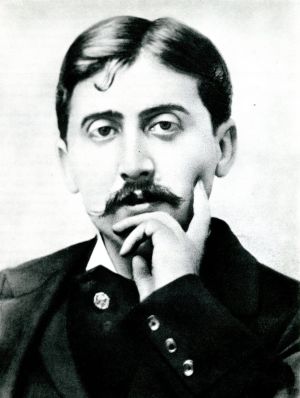One of our staff members is contributing considerably to a News Archiving service at Mu. Any well educated (Masters, PhD or above) users who wish to make comments on news sites, please contact Jim Burton directly rather than using this list, and we can work on maximising view count.
Marcel Proust: Difference between revisions
No edit summary |
No edit summary |
||
| Line 1: | Line 1: | ||
[[File:Marcel-Proust photo.jpg|thumb|Marcel Proust]] | |||
'''Marcel Proust''', in full, '''Valentin Louis Georges Eugène Marcel Proust''' (10 July 1871 – 18 November 1922) was a French novelist, literary critic, and essayist who wrote the monumental novel ''In Search of Lost Time'' (''À la recherche du temps perdu''; with the previous English title translation of ''Remembrance of Things Past''), originally written in French and published in seven volumes between 1913 and 1927. He is considered by critics and writers to be one of the most influential authors of the 20th century. | '''Marcel Proust''', in full, '''Valentin Louis Georges Eugène Marcel Proust''' (10 July 1871 – 18 November 1922) was a French novelist, literary critic, and essayist who wrote the monumental novel ''In Search of Lost Time'' (''À la recherche du temps perdu''; with the previous English title translation of ''Remembrance of Things Past''), originally written in French and published in seven volumes between 1913 and 1927. He is considered by critics and writers to be one of the most influential authors of the 20th century. | ||
Revision as of 18:40, 27 March 2023

Marcel Proust, in full, Valentin Louis Georges Eugène Marcel Proust (10 July 1871 – 18 November 1922) was a French novelist, literary critic, and essayist who wrote the monumental novel In Search of Lost Time (À la recherche du temps perdu; with the previous English title translation of Remembrance of Things Past), originally written in French and published in seven volumes between 1913 and 1927. He is considered by critics and writers to be one of the most influential authors of the 20th century.
Proust's weitings were influential for many French thinkers including Michel Foucault and Gilles Deleuze. His first known poem, written when he was 17, was titled "Pederasty." The poem shows him struggling with his homosexual feelings. Dedicated to his friend Daniel Halévy, he wrote to him in a letter: “Don’t treat me as a pederast, that wounds me. Morally I’m trying, if only out of a sense of elegance, to remain pure.” The poem reads:
Pederasty (estimated date: November 1888).
Translated by Richard Howard
To Daniel Halévy
If I had money from a boundless mintand sinew enough in hands, lips, loins, I’d shun the vanity of politics and print, and leave — tomorrow? No, tonight! — for lawns luminous with artificial green (without the rustic flaws of frost and vermin), where I’d forever be sleeping with one warm child or other: François? Firmin? . . .For what is manly mockery to me? Let Sodom’s apples burn, acre by acre, I’d savor still the sweat of those sweet limbs! Beneath a solar gold, a lunar nacre, I’d... languish (an ars moriendi of my own), deaf to the knell of dreary Decency!
Proust writes to Halévy later in 1888, “You think me jaded and effete. You are mistaken. If you are delicious, if you have lovely eyes which reflect the grace and refinement of your mind with such purity that I feel I cannot fully love your mind without kissing your eyes, if your body and mind, like your thoughts, are so lithe and slender that I feel I could mingle more intimately with your thoughts by sitting on your lap, if, finally, I feel that the charm of your person, in which I cannot separate your keen mind from your agile body, would refine and enhance ‘the sweet joy of love’ for me, there is nothing in all that to deserve your contemptuous words, which would have been more fittingly addressed to someone surfeited with women and seeking new pleasures in pederasty.” (Letter translated by Terrence Kilmartin.) At about that time, Halévy wrote in his journal, “Take Proust. As talented as they come and yet look at how he overdoes it. Weak, young, he screws, he masturbates, maybe he even pederasts! But maybe in his life he’ll show flashes of hidden genius.”[1]
References
- ↑ The Daily Beast, Marcel Proust’s First Poem, ‘Pederasty,’ Shows Him Struggling With Homosexuality (2017).